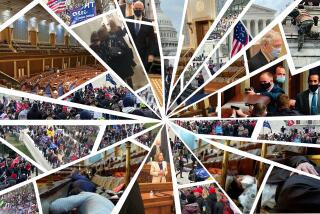Sen. Rand Paul ends marathon filibuster of John Brennan
WASHINGTON – Sen. Rand Paul ended a marathon filibuster of John Brennan’s nomination to lead the CIA early Thursday after holding the floor for nearly 13 hours, focusing on concerns over the constitutionality of the administration’s use of drone strikes to target suspected terrorists.
The Kentucky Republican began speaking at 11:47 a.m. Wednesday and yielded the floor at 12:39 a.m. Thursday.
A self-described champion of constitutional liberties, Paul said he simply wanted the White House to assure him that it had no authority to target an American within the United States under the drone program.
“I am hopeful that we have drawn attention to this issue, that this issue won’t fade away, and that the president will tomorrow come up with a response,” he said. “This isn’t the end of this; this is the beginning of this.”
What began as a one-man crusade to delay the Brennan nomination ended as a team effort as Wednesday turned to Thursday in the nation’s capital. Even Paul’s Kentucky colleague, Senate Minority Leader Mitch McConnell, took part in the discussion, announcing that he would not only vote against Brennan’s confirmation, but would vote to block the Senate from even considering the nomination when a procedural vote occurs, probably later this week.
McConnell was one of a cast of Republican reinforcements who came to the Senate chamber in the filibuster’s 12th hour. In all, 15 senators joined Paul – 13 Republicans and two Democrats. The cast included two senators who hours earlier had dined with President Obama at a nearby restaurant. Several freshman Republicans who had yet to deliver a speech in the chamber made their first in support of Paul’s filibuster.
Hours earlier, Sen. Mark Steven Kirk of Illinois, still impaired as he recovers from a stroke, came to the chamber to deliver an apple and green tea in a Thermos his office had just purchased for $35 from a nearby Frager’s Hardware store.
“I think most Americans think about that scene out of ‘Mr. Smith Goes to Washington,’ ” Kirk explained as he left the Senate, referring to the 1939 film that boosted the career of star Jimmy Stewart. “There was a lot of caffeine in that green tea to get him going.”
Just 24 hours earlier, Brennan appeared on a glide path to confirmation. The Senate Intelligence Committee voted 12 to 3 to forward his nomination to the full Senate, after the White House agreed to give the House and Senate intelligence committees secret Justice Department opinions on the targeted killings of terrorism suspects overseas.
Unsure whether he had enough senators to delay consideration of the nomination using typical delaying tactics, Paul turned to a more traditional tool: a talk-until-you-drop speech in accordance with Senate rules that allow speakers to continue uninterrupted for as long as they wish. They must stay on the floor but can yield to questions, which allowed Paul’s colleagues to give him some relief.
“I have allowed the president to pick his appointees, but I will not sit quietly and let him shred the Constitution,” Paul said early in his remarks. “I cannot sit at my desk quietly and let the president say he will kill Americans on American soil who are not actively attacking the country.”
A vote that leaders had hoped would occur Wednesday was first pushed to Thursday. By the time Paul finished, Democrats said a vote would not come until Saturday.
“We’re through for the night,” a frustrated Senate Majority Leader Harry Reid said.
Paul talked alone until about three hours into the filibuster, when two Republicans – Mike Lee of Utah and Ted Cruz of Texas – came to allow Paul to rest by yielding so they could pose questions to him. Cruz compared Paul with the heroes of the Battle of the Alamo, which ended on this day 177 years ago.
Democrat Ron Wyden of Oregon came later to say that he supported Paul’s push for greater oversight of the administration’s efforts. He had voted to support Brennan’s nomination in committee the day before, but only after the White House agreed to provide all of the Justice Department’s secret legal opinions on killing terrorism suspects abroad.
Brennan “will be a principled and effective leader that the CIA needs and deserves,” Wyden said. But “I think Sen. Paul and I agree that this nomination also provides a very important opportunity for the United States Senate to consider the government’s rules and policies on the targeted killings of Americans.”
“What it comes down to is, every American has the right to know when their government believes that it is allowed to kill them,” Wyden said.
Another senator who came in solidarity, Florida Republican Marco Rubio, had also voted for Brennan the day before, and argued after leaving the Senate floor that he continued to support Obama’s choice.
“The issue’s not Brennan. The issue is whether members of the Senate have the right to ask relevant, significant and important public policy questions and get a direct answer from this administration,” said Rubio, a potential rival of Paul’s in a 2016 Republican presidential nomination fight. “This is not in defense of Sen. Paul; this is in defense of the institution and of its right to do its job by having relevant information given to them.”
Paul’s filibuster was the longest in more than two decades, passing a nearly nine-hour effort from Sen. Bernie Sanders (I-Vt.) in 2010 in opposition to extending the George W. Bush-era tax rates.
Paul often recycled arguments as he continued, referring to one of several binders at his desk, or notes passed on occasion from an aide.
While Paul was speaking, his office was posting messages on his official Twitter page. Cruz, in his second trip to the Senate chamber, read some of the supportive messages others had posted on the social networking site, using the hashtag #standwithrand. The National Republican Senatorial Committee sent an email to supporters soliciting online contributions in his name.
Paul first appeared ready to yield the floor after 7 p.m., offering to allow a vote to occur on Brennan if senators would agree to his request for a resolution expressing the sense of the Senate that drone strikes on U.S. soil violated citizens’ right to due process.
Sen. Richard J. Durbin, the second-ranking Democrat, objected while promising to hold a hearing on drone policy. Paul opted to continue speaking instead.
Paul remained standing the entire time, using the occasional breaks to amble about to stretch his legs while a colleague posed a question to him.
As afternoon turned to evening, Paul’s body language revealed the physical toll his effort was taking. At one point, he spoke while chewing on jelly beans from a packet delivered by an aide.
Otherwise, the Senate chamber remained largely empty for most of the day, save for a rotating group of tourists in the gallery and less-tenured senators who cycled through in the chair of the presiding officer.
Each hour, a Senate stenographer would come to replace another near Paul’s desk, dutifully recording every word of his remarks for the official record.
As midnight approached, additional senators came to the floor. So too did a handful of members of the House of Representatives, who sat in the rear of the chamber.
Before Paul finally yielded, he joked that he had hoped to continue for another 12 hours to break the all-time record for a filibuster, held by Strom Thurmond.
But, he joked, “I’ve discovered that there are some limits to filibustering, and I’m going to have to go take care of one of those in a few minutes.”
Follow Politics Now on Twitter and Facebook
Twitter: @mikememoli
More to Read
Get the L.A. Times Politics newsletter
Deeply reported insights into legislation, politics and policy from Sacramento, Washington and beyond. In your inbox three times per week.
You may occasionally receive promotional content from the Los Angeles Times.











